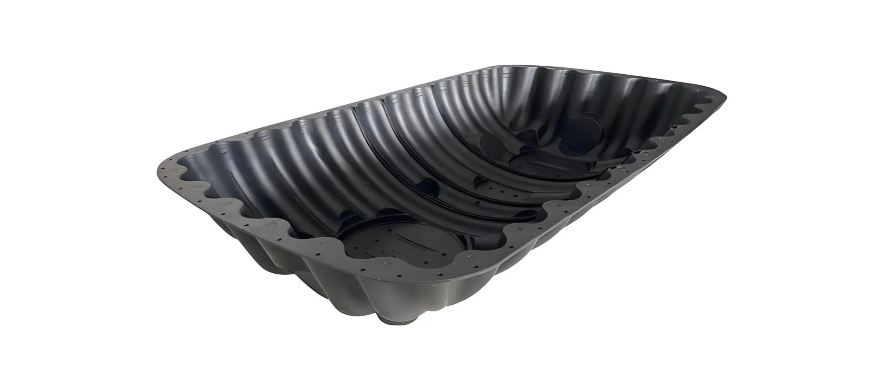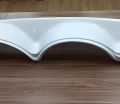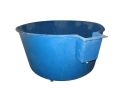
Choosing the right boat material is crucial when selecting a flats boat, as it directly impacts performance, durability, and overall experience. In this comparison of aluminum vs fiberglass flats boat, we’ll examine the distinct advantages and disadvantages of each. Aluminum boats are typically lighter and more durable, offering great resistance to corrosion, which makes them ideal for navigating shallow waters. However, they can be noisier and more prone to dents. On the other hand, fiberglass flats boats offer a smoother ride and greater stability, especially in rougher conditions. They can accommodate more intricate designs, but they are heavier and more susceptible to cracks. Understanding the material properties and performance differences in aluminum vs fiberglass flats boat will help you make a well-informed decision based on your fishing style and environment.
Aluminum vs Fiberglass Flats Boat: Which Is Better for Your Needs?
Choosing the right flats boat often comes down to a key decision: aluminum vs fiberglass flats boat. Each material offers unique advantages and challenges, making it essential to assess their suitability for your fishing environment, budget, and specific needs.
Pros and Cons of Aluminum vs Fiberglass Flats Boat
Both aluminum and fiberglass flats boats have specific strengths and drawbacks that make them suitable for different scenarios. Understanding these aspects can help guide your decision.
Advantages of Aluminum Flats Boats
- Durability in Rough Conditions
Aluminum flats boats are exceptionally tough, capable of withstanding impacts with rocks, logs, and other obstacles commonly encountered in shallow waters. - Lightweight and Portable
The lightweight design of aluminum makes these boats easy to launch, transport, and handle, especially in remote or hard-to-reach fishing areas. - Cost Efficiency
Aluminum boats are generally more affordable upfront and have lower maintenance costs, making them an attractive option for budget-conscious anglers. - Easy Repairs
Minor dents or scratches in aluminum can often be repaired on-site with basic tools, ensuring that the boat remains functional without expensive professional help. - Shallow Water Adaptability
The shallow draft of aluminum boats allows them to navigate skinny waters, giving anglers access to areas that might be inaccessible with fiberglass boats.
Drawbacks of Aluminum Flats Boats
- Noisier on the Water
The material amplifies vibrations and noise, which can scare away fish or disturb the serene environment many anglers value. - Aesthetic Limitations
Aluminum boats often lack the polished look of fiberglass models, focusing more on function than style. - Corrosion Risks in Saltwater
Without proper maintenance or protective coatings, aluminum is susceptible to corrosion, particularly in saltwater conditions.
Advantages of Fiberglass Flats Boats
- Stability in Choppy Waters
Fiberglass boats excel in rougher conditions, providing superior stability and a smoother ride due to their heavier construction and design. - Enhanced Aesthetic Appeal
The sleek and customizable designs of fiberglass boats make them visually appealing and adaptable to a wide range of uses. - Quiet Operation
Fiberglass absorbs sound better than aluminum, ensuring a quieter ride that is ideal for fishing or other activities requiring stealth. - Corrosion Resistance
Unlike aluminum, fiberglass is naturally resistant to rust and corrosion, making it well-suited for saltwater or brackish environments. - Customization Options
Fiberglass boats often feature advanced layouts with built-in storage compartments, rod holders, and other amenities tailored to anglers’ needs.
Drawbacks of Fiberglass Flats Boats
- Higher Costs
Both the initial purchase price and maintenance expenses for fiberglass boats tend to be higher than aluminum options. - Heavy Construction
The additional weight of fiberglass can make these boats harder to transport and less maneuverable in extremely shallow waters. - Complex Repairs
Damages to fiberglass, such as cracks or hull breaches, often require professional repair services, which can be costly and time-consuming.
Aluminum vs Fiberglass Flats Boat for Fishing
Fishing is one of the most common uses for flats boats, and the choice between aluminum vs fiberglass flats boat often depends on the fishing environment and style.
Aluminum Flats Boats for Fishing
Aluminum flats boats are particularly well-suited for rugged environments where durability and access to hard-to-reach areas are crucial. Their lightweight design allows anglers to navigate shallow waters and tight spaces with ease. These boats are also a practical choice for those fishing in freshwater rivers or lakes with rocky bottoms, as they can handle the occasional scrape or bump without major damage.
Fiberglass Flats Boats for Fishing
Fiberglass flats boats are ideal for anglers who prioritize comfort, stability, and a quieter experience. Their smooth ride and noise reduction make them perfect for fishing in calm or open waters where stealth is essential. Additionally, fiberglass boats often come with advanced features like live wells, tackle storage, and seating arrangements, making them a luxurious choice for serious anglers.
Maintenance Insights: Aluminum vs Fiberglass Flats Boat
The long-term costs and effort required to maintain a flats boat can significantly influence the decision.
Maintaining Aluminum Flats Boats
Aluminum boats require less intensive maintenance overall. Regular cleaning and a fresh water rinse after saltwater use help prevent corrosion. Small dents or scratches are easily repaired, often with basic tools, keeping maintenance costs low and manageable.
Maintaining Fiberglass Flats Boats
Fiberglass boats demand more attention to maintain their appearance and functionality. Regular waxing and cleaning protect the gel coat from wear and sun damage. Cracks or chips in the hull should be repaired promptly, often requiring professional assistance.
Real-World Feedback on Aluminum vs Fiberglass Flats Boat
Anglers often share insights about their experiences with flats boats, highlighting the strengths and weaknesses of each material.
- Aluminum Flats Boats
Many users praise aluminum boats for their ruggedness and ability to handle impacts in shallow or rocky areas. However, some note the noisier operation can be a drawback when fishing in quiet environments. - Fiberglass Flats Boats
Anglers who prefer fiberglass boats often highlight their stability and smooth performance in choppy waters. The luxurious design and quieter ride are frequently mentioned as key selling points, though the higher costs can be a barrier for some.
The choice between aluminum vs fiberglass flats boat ultimately comes down to personal priorities and intended use. Aluminum boats are a durable, cost-effective option for anglers navigating rugged and shallow environments, while fiberglass boats provide superior comfort, stability, and style for open waters or calm conditions. By assessing your specific needs, you can confidently select the flats boat that will enhance your fishing experience and ensure years of enjoyment on the water.
Fiberglass or Aluminum River Boat: Which Boat is Best for You
Aluminum vs Fiberglass Flats Boat: Which Should You Choose
When deciding on an aluminum vs fiberglass flats boat, understanding the unique qualities of each material is crucial. Both offer distinct advantages and disadvantages, making them suitable for different environments and uses. By examining factors such as performance, durability, cost, and maintenance, you can determine which type of flats boat is the best fit for your fishing and boating needs.
Aluminum vs Fiberglass Flats Boat Pros and Cons
Advantages of Aluminum Flats Boats
Aluminum flats boats are known for their practicality and resilience, especially in shallow or rugged environments.
- Lightweight Design
The lightweight nature of aluminum makes these boats easy to transport and launch, even in hard-to-reach areas. Their reduced weight also enhances fuel efficiency, making them a cost-effective choice for frequent use. - Durability Against Impacts
Aluminum boats are highly resistant to damage from rocks, stumps, and other obstacles commonly found in shallow waters. This makes them ideal for exploring and fishing in less forgiving environments. - Affordability
Compared to fiberglass, aluminum boats are generally more affordable to purchase and maintain, making them accessible to a wider range of buyers. - Ease of Repairs
Minor dents and scratches in aluminum boats can often be fixed on-site with basic tools, reducing downtime and repair costs. - Shallow Water Adaptability
Their shallow draft allows aluminum flats boats to navigate skinny waters, giving anglers access to hard-to-reach fishing spots.
Disadvantages of Aluminum Flats Boats
- Noisy Operation
Aluminum tends to amplify noise and vibrations, which can scare away fish or disrupt the serene environment many boaters seek. - Prone to Corrosion
Without proper maintenance or protective coatings, aluminum can corrode, particularly in saltwater environments. - Less Aesthetic Appeal
Aluminum boats often lack the sleek and modern appearance of fiberglass models, focusing more on function than form.
Advantages of Fiberglass Flats Boats
Fiberglass flats boats are prized for their stability, aesthetics, and versatility in a range of water conditions.
- Smoother Ride
The heavier construction of fiberglass boats reduces turbulence, providing a smoother and more comfortable ride for passengers. - Quiet Performance
Fiberglass absorbs vibrations and sound, making these boats quieter and ideal for activities like fishing that require stealth. - Customizable Designs
Fiberglass boats offer more advanced layouts, with features such as built-in storage, rod holders, and seating configurations that enhance functionality and comfort. - Resistance to Corrosion
Unlike aluminum, fiberglass is naturally resistant to rust and corrosion, making it a durable choice for saltwater or brackish conditions. - High-End Aesthetic Appeal
The sleek finish and customizable features of fiberglass boats give them a luxurious appearance that appeals to many boaters.
Disadvantages of Fiberglass Flats Boats
- Higher Costs
The initial purchase price of fiberglass boats is often significantly higher than aluminum options, and maintenance expenses can also add up over time. - Heavier Construction
The additional weight of fiberglass boats can make them harder to transport and less maneuverable in very shallow waters. - Complex Repairs
Cracks or hull damage in fiberglass boats typically require professional repair, which can be time-consuming and costly.
Aluminum vs Fiberglass Flats Boat Price
The cost of aluminum vs fiberglass flats boats varies based on factors such as size, features, and intended use.
Initial Costs
Aluminum flats boats are generally more budget-friendly, with base models available at lower prices than their fiberglass counterparts. Fiberglass boats, while more expensive, often include advanced features and luxurious designs that justify their higher price tag for certain buyers.
Maintenance Costs
Maintenance costs also differ significantly. Aluminum boats are easier and cheaper to maintain, requiring basic cleaning and occasional checks for dents or corrosion. Fiberglass boats need regular polishing to protect the gel coat and professional repairs for damage, increasing long-term expenses.
Value for Money
Aluminum boats offer excellent value for money due to their affordability and resilience, especially for anglers who frequent shallow or rugged waters. Fiberglass boats, on the other hand, deliver superior comfort, aesthetics, and performance, making them a worthwhile investment for those who prioritize these features.
Fiberglass vs Aluminum Duck Boat: Pros and Cons for Hunters
Final Thoughts on Aluminum vs Fiberglass Flats Boat
Choosing between aluminum vs fiberglass flats boat depends on your boating environment, usage priorities, and budget. Aluminum boats excel in durability, cost efficiency, and shallow water performance, making them ideal for rugged conditions. Fiberglass boats offer unmatched stability, comfort, and aesthetic appeal, making them perfect for open water or saltwater environments. By weighing the pros and cons outlined here, you can confidently select the flats boat that best suits your needs and enhances your time on the water.
Aluminum vs Fiberglass Flats Boat Saltwater Performance
The performance of aluminum vs fiberglass flats boats in saltwater conditions is a key consideration for anglers operating in coastal areas.
Aluminum in Saltwater
Aluminum boats can perform well in saltwater but require extra care to prevent corrosion. Regular rinsing and the application of anti-corrosion coatings are essential to maintain their longevity.
Fiberglass in Saltwater
Fiberglass boats excel in saltwater environments due to their natural resistance to corrosion. They require less maintenance in these conditions, making them a more convenient option for saltwater fishing and boating.
Coastal Durability
For long-term use in coastal conditions, fiberglass boats are generally more durable and low-maintenance. Aluminum boats can match their performance with proper upkeep, but the added effort may not appeal to all users.
Aluminum vs Fiberglass Flats Boat Cost
The cost considerations for aluminum vs fiberglass flats boats extend beyond the initial purchase price, encompassing factors like fuel efficiency, repairs, and maintenance.
Upfront Costs
Aluminum boats are typically less expensive upfront, making them an attractive option for budget-conscious buyers. Fiberglass boats require a higher initial investment, but their advanced features and comfort may justify the price for certain users.
Long-Term Expenses
Fiberglass boats often incur higher long-term costs due to their maintenance needs and professional repair requirements. Aluminum boats, with their simpler upkeep, are generally more economical over time.
Budget Considerations
Buyers should consider how often they plan to use the boat, the type of water they’ll frequent, and their budget for maintenance when deciding between aluminum and fiberglass.
Best Fiberglass Transom Aluminum Boat Options for Every Budget
FAQs about Aluminum Vs Fiberglass Flats Boat
Choosing between aluminum and fiberglass for a boat largely depends on your specific needs, budget, and the type of boating you plan to do. Aluminum boats are generally lighter, which makes them easier to transport, trailer, and handle in the water. They are also more affordable than fiberglass boats, with lower maintenance costs since they don’t require gel coat care. Aluminum is highly resistant to corrosion, particularly in freshwater environments, but it is more prone to dents and scratches.
Fiberglass boats, on the other hand, are typically more stable in the water due to their heavier build, which provides a smoother ride in rough conditions. They are often more durable over time, especially when it comes to resisting impacts that could cause dents in aluminum boats. However, fiberglass boats can be more expensive upfront and are harder to repair. They also require regular maintenance to prevent cracking and preserve the gel coat. Ultimately, the decision will depend on the type of watercraft you need and how much you’re willing to invest in upkeep and performance.
Fiberglass boats, while offering superior ride quality and aesthetic appeal, come with some significant downsides. First, they are heavier than aluminum boats, making them more difficult to transport and maneuver. This additional weight can be an issue if you need to tow the boat long distances or launch it from a small ramp.
Another disadvantage is the cost. Fiberglass boats are generally more expensive both to purchase and maintain. The repairs on fiberglass boats can be costly, particularly when dealing with hull cracks, which require specialized skills and materials to fix. Additionally, fiberglass boats require more regular maintenance to ensure that the gel coat is intact and doesn’t degrade over time. The heavier construction also makes fiberglass boats less responsive in certain water conditions, especially when it comes to shallow waters or areas with debris.
The lifespan of a boat depends on various factors, such as the materials used, maintenance, and the conditions in which the boat is used. In general, fiberglass boats can last longer than aluminum boats if they are well-maintained. Fiberglass is highly resistant to corrosion, especially in saltwater, which makes it a durable option for coastal boating. However, fiberglass is more susceptible to cracks and damage from impacts, which could shorten its lifespan if not repaired promptly.
On the other hand, aluminum boats are more durable in terms of resistance to physical impacts, as they are less likely to crack. However, aluminum can suffer from corrosion over time, particularly in saltwater environments, which can reduce its overall longevity. With proper care, both types of boats can last for many years, but fiberglass tends to have a longer lifespan when it comes to resistance to environmental factors like saltwater corrosion. Regular maintenance and prompt repairs are essential for both materials to ensure their longevity.

As the editor of GangLong Fiberglass, I have years of experience and in-depth research, focusing on cable tray products, fiberglass solutions, and grille systems. I incorporate years of industry insights and practical experience into every content, committed to promoting the progress of the industry. At GangLong Fiberglass, my commitment is reflected in every product, from innovative cable trays to durable fiberglass solutions and sturdy grille systems. As an authoritative voice in the industry, my goal is to provide valuable information to professionals and businesses and promote forward-looking solutions.


